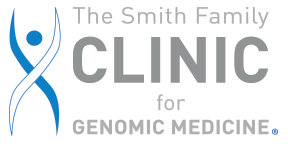Rare disease patients spend an average of eight years searching for a diagnosis, and for some, that search can last decades.
April Hudson of Quinton, Ala., began showing symptoms of an unknown disease at three years old. She would go on to see 200 physicians before finally learning the true cause of her symptoms nearly 40 years later.
Allergic to the cold?
April was no stranger to sickness as a child.
“I was that child who would always run a low-grade fever, always had a sinus infection and was just always sick,” said April.
At 14 years old, a doctor told April she seemed to be “allergic to the cold.” She was skeptical, but years later, discovered that there was some truth in his observation.
Despite her constant battle with the unknown, April continued to live an active and normal life. Throughout her 20s and 30s, she worked three jobs, graduated from college and started a company.
Life took an abrupt turn in 2014 when April noticed a major change in her feet.
“It was like my feet were deteriorating to the point where on an X-ray, they looked like an animal’s feet,” she said.
April has a family history of Charcot-Marie-tooth disease (CMT), an inherited neurological disorder that affects peripheral nerves. Six of her family members have been diagnosed with CMT, so April thought this was likely the cause of her symptoms as well.
“I went forward with the foot correction surgery, and recovery was terrible,” she explained. “I couldn’t heal. I was constantly sick and never really recovered.”
April was unable to walk and had to use a wheelchair for four months after the surgery. Even today, she still has trouble walking and wears orthopedic shoes.
The search for answers
In 2016, April was also diagnosed with eosinophilic esophagitis (EoE), a rare chronic immune system disease that causes inflammation of the esophagus. This new information did not explain all of April’s symptoms, so she continued her search for an underlying diagnosis. That quest brought her to the Smith Family Clinic for Genomic Medicine.
“I came across a Roku app called ‘This is Alabama’ and I noticed HudsonAlpha was featured. At that point, I decided I was going to call.”
HudsonAlpha Institute for Biotechnology opened the Smith Family Clinic in 2015 to use genomic sequencing to diagnose patients like April who have undiagnosed or misdiagnosed conditions.
April got in touch with the clinic and was not only accepted as a patient, but also was able to use the Hero Fund, which provides financial assistance to qualified Smith Family Clinic patients.
After 40 years of doctors appointments, failed surgeries and misdiagnoses, whole genome sequencing led to the correct diagnosis in 2017. April had a change in the NLRP3 gene, which is associated with familial cold autoinflammatory syndrome (FCAS).
FCAS is a very rare condition that causes fever, skin rash, and joint pain after exposure to cold temperatures.
“It tied everything together,” said April. “The more research I did on the NLRP3 gene and the mutations associated with the disease, the more it made sense.”
Hope for the future
With the correct diagnosis in hand, April’s children decided to be tested for the NLRP3 gene change. Their results came back negative, and with a grandchild on the way, she could not have been happier.
“To know that I don’t have to worry about this with my children and my grandchild is a huge relief,” she said.
Although there is no cure for FCAS, April is able to move forward and treat her condition. She is seeing an immunologist and is on a medication that already is helping her.
“Without whole genome sequencing, there is no doubt in my mind that there would have been thousands of dollars invested in hunting down a disease that we would’ve probably never found,” said April. “The medicine is very expensive, but because I had the sequencing done and documented evidence that it will help, [my insurance] covered the cost.”
April hopes she can be a voice for others on a similar journey and encourage them in their search for a diagnosis.
“If you’re looking for answers, pick up the phone and call the Smith Family Clinic because that’s where I found mine.”
If you, or someone you know, are interested in becoming a clinic patient, call 256-327-9640 or visit smithfamilyclinic.org for more information.

